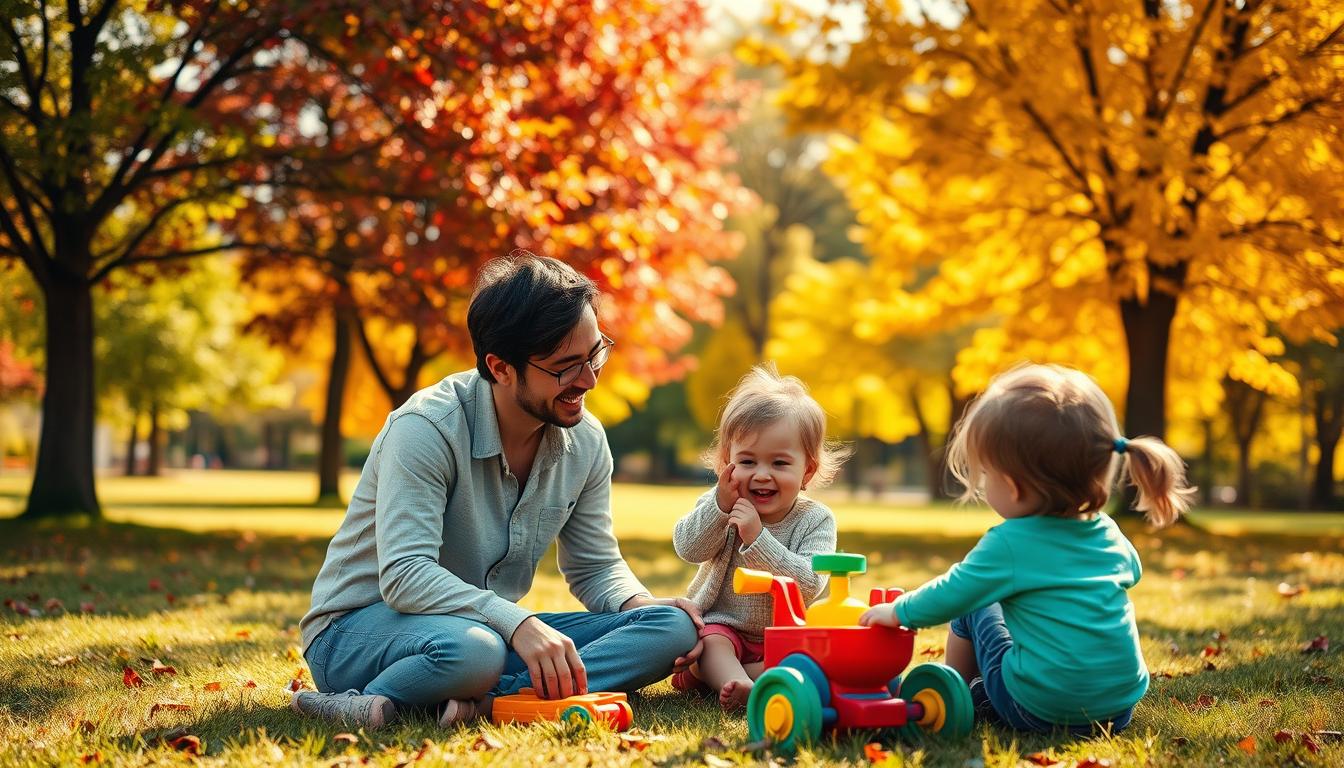Have you ever wondered why some kids easily make friends, while others struggle? Making friends in elementary school is shaped by many things. This includes how parents raise their children and the kids’ emotional and social abilities.
Building friendships in elementary school depends a lot on kids’ emotional skills and how well they can manage their feelings. These skills are shaped by how involved parents are. Authoritarian parenting, which is strict but cold, can lead to kids having trouble making friends. But, parents who are warm and use reason can help their kids get along better with others.
When parents handle negative feelings in a kind and helpful way, kids learn to control their emotions better. They also learn to see things from other people’s point of view. This helps them feel empathy, which is key for making and keeping friends.
Key Takeaways
- Emotional skills, self-regulation, and social competence are crucial for children’s friendships.
- Positive parenting styles promote prosocial behaviors and better peer relationships.
- Teaching empathy helps children understand and connect with peers.
- Children learn better social skills through modeling positive behavior.
- Parental involvement and guidance are key to helping children navigate social interactions in elementary school.
Understanding the Importance of Friendships in Elementary School
Friendships are key for your child’s growth, especially in elementary school. These early connections help with emotional and social skills. They shape your child’s future in big ways.
The Role of Friendships in Child Development
Children with strong friendships in elementary school do better socially and emotionally. A Finnish study with 1,523 kids showed that well-liked ones keep friendships longer. This shows how important being liked by peers is.
But, issues like childhood eating disorders can hurt these friendships. Parental depression and control can also lead to broken friendships. This was seen in a study from grades 2 to 6.
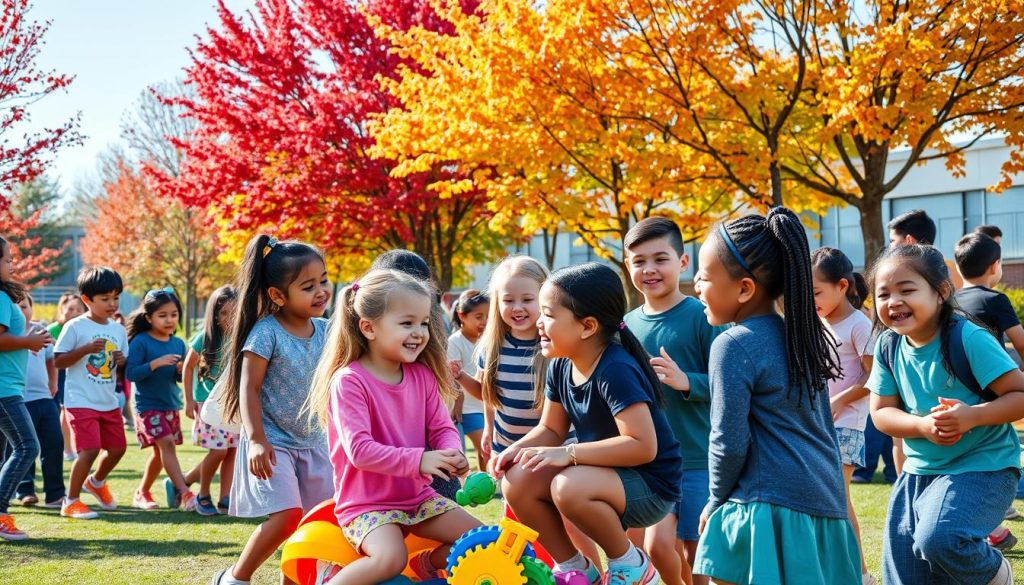
In the U.S., a study found that 35% of kindergarten friendships lasted until 3rd grade. These early friendships help kids learn to be better friends. They make kids more enjoyable to be around.
Emotional and Social Benefits of Friendships
Children with good friendships do better emotionally and socially. They feel more confident and handle life’s challenges better. Talking to kids about puberty helps build trust in their friendships.
Being liked by peers is good for emotional health. It also helps kids learn to control their feelings. This is because they get positive emotional responses from their parents.
When parenting gets tough, remember that friendships are crucial for your child’s emotional and social life. Support these friendships with love and encouragement. This will help your child grow into a kind and popular person.
Developing Social Skills and Emotional Intelligence
It’s key to help kids develop social skills and emotional smarts. These skills help them make friends, make smart choices, and handle life’s ups and downs.
Helping Your Child Recognize and Manage Emotions
It’s important for kids to share their feelings and know they’re heard. Mindfulness, like deep breathing or yoga, helps them manage their emotions. This is especially helpful when dealing with divorce, as it brings stability.
Teaching Empathy and Understanding Perspectives
Empathy and seeing things from another’s point of view are key for good friendships. Parents should show empathy and teach kids to see things from others’ angles. Activities like journaling or art can help kids understand their feelings. Also, exposing kids to different experiences builds empathy and kindness, helping avoid middle child syndrome.
Modeling Positive Social Interactions at Home
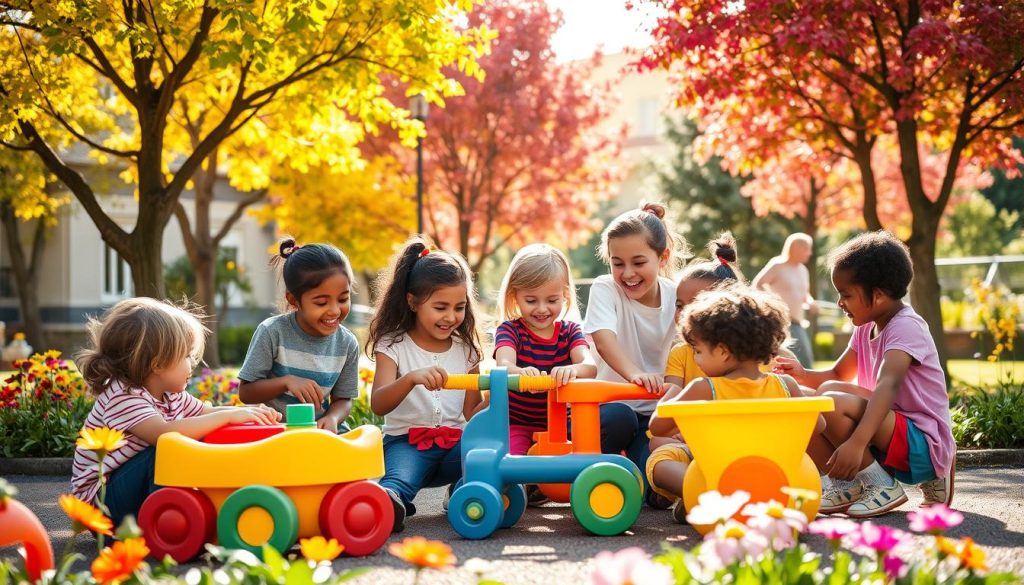
Kids learn from what they see at home. Parents should show healthy ways to interact with others. Letting kids make choices and take responsibility boosts their confidence and social skills. Supporting their sports or playdates helps build lasting social abilities.
Encouraging Positive Play and Cooperative Activities
Creating a space for positive play and teamwork is key for kids’ social and emotional growth. Kids start with different play types and move to teamwork around ages 4 to 5, as Healthline notes. This stage helps them share, work together, and improve communication and problem-solving.
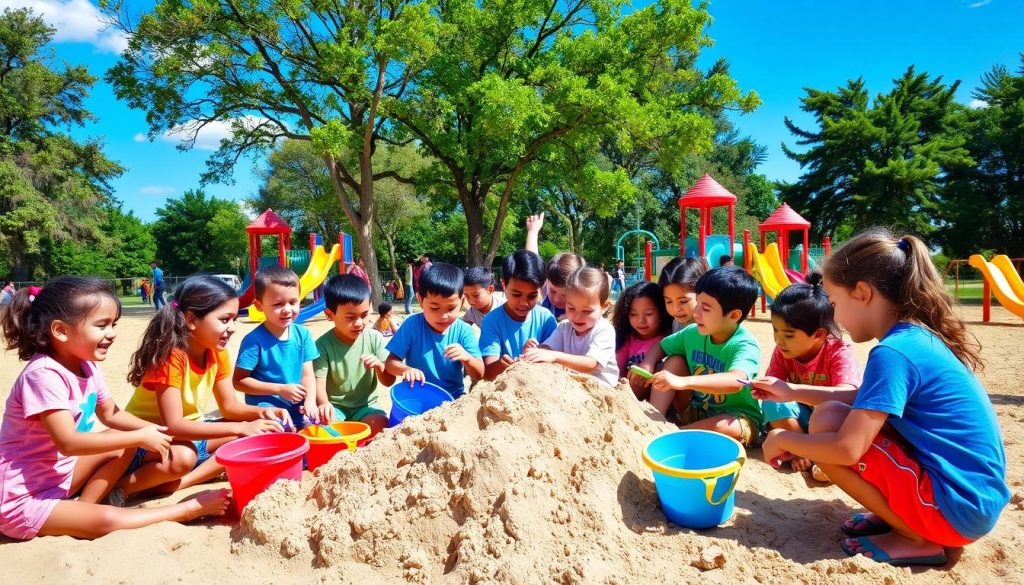
Parents are vital in supporting teamwork play. Procare Early Learning suggests playdates with games that don’t lead to fights. By removing items that cause disputes, you make space for better social interactions.
Adding eco-friendly activities to playtime can boost teamwork. Projects like recycling or nature walks teach kids to work together and care for the planet. Cooking or baking together also helps with counting and following directions. Building a fort together can improve vocabulary and teach sharing.
Team play not only builds social skills but also character traits like empathy and patience. Studies show that team sports like soccer teach the importance of working together. Group art projects and role-playing also enhance creativity, communication, and problem-solving.
If your child isn’t into teamwork by late preschool, talk to their pediatrician. Early help, like online family therapy, can support their social growth. It’s also important to teach kids about safe online behavior.
Encouraging teamwork sets the stage for strong relationships. By supporting teamwork and collaborative activities, you help your child develop essential social skills. This prepares them for a lifetime of positive connections.
Overcoming Shyness and Social Anxiety
Children often struggle with shyness and social anxiety, especially in places like school or soccer. As a parent, it’s key to understand their personality and offer support. A gentle approach helps them feel more at ease.
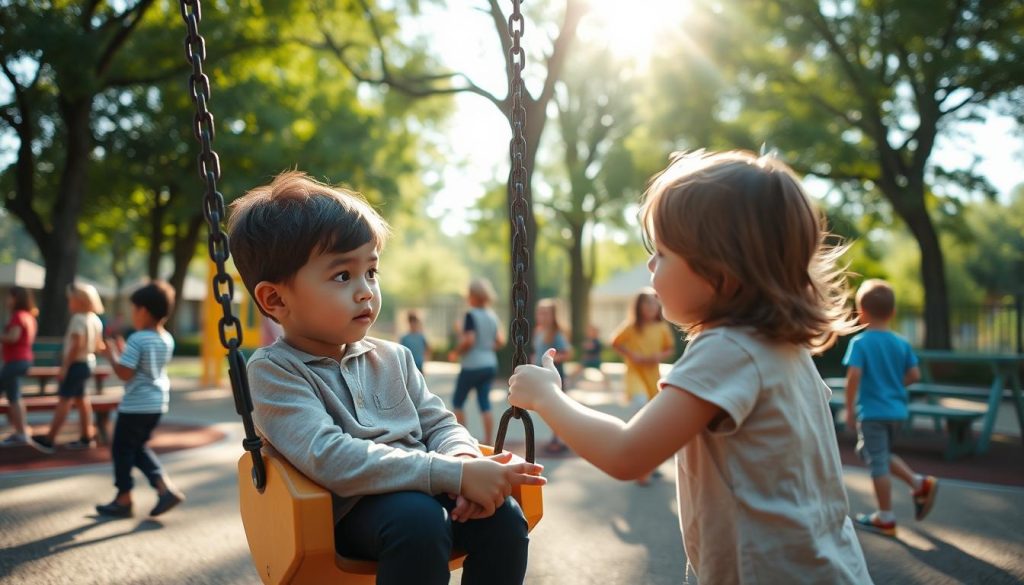
Gradual Exposure to Social Situations
Helping kids get used to social situations is important. Start by letting them watch before they join in. Role-playing and scripting can help. Also, arriving early or late can make them feel less stressed.
Always check how they’re feeling. Make sure to respect their pace and boundaries.
Creating Safe and Welcoming Environments
Creating a safe space is vital for kids with social anxiety. Listen to their fears and never shame them. Encourage them to make friends, even if it’s just a few.
Teach them to trust themselves and use self-soothing techniques. This can help them feel more confident.
Consulting Professionals When Needed
If shyness and anxiety are too much, getting help from experts is a good idea. Cognitive Behavioral Therapy (CBT) is very effective. Therapists can teach kids how to cope with anxiety.
Mindfulness, like deep breathing, can also help. It’s important to focus on your child’s happiness, not just what others think. Budgeting for therapy might be needed if anxiety is a big problem.
Arranging Playdates and Extracurricular Activities
Playdates help kids make friends and learn important social skills. They are key for emotional and social growth. By planning playdates and extracurricular activities, parents can help their kids develop socially while cutting down on screen time.
Planning Successful Playdates
Setting up a playdate can be both fun and challenging. Start with clear rules, like how long it will last and what to do. Make sure the place is safe and welcoming.
Hosting playdates at home can make kids feel more at ease. About 80% of successful playdates have planned activities, like building forts or playing games together. This helps kids feel more confident and less stressed.
It’s also good to set time limits. This helps prevent kids from getting too tired. About 90% of parents find this helpful.
Exploring Extracurricular Opportunities
Extracurricular activities let kids meet others with similar interests. They can join sports or arts clubs. This helps them make friends outside of school.
These activities also teach kids about consent and respect. For example, team sports teach kids about boundaries and working together. Offering a variety of experiences helps kids grow socially, emotionally, and intellectually.
Parenting Challenges: Helping Your Child Navigate Social Conflicts
Children often face tough times like being rejected by peers or bullied. Your support is key in helping them grow strong and develop good social skills. It’s important to understand that they might act out by ignoring rules, teasing others, or getting defensive.
Handling Peer Rejection and Bullying
One good way to tackle peer rejection and bullying is by talking openly. Make sure your child knows they can share their feelings with you. Being empathetic and validating helps them feel heard, not judged.
Ask questions that make them think deeply about their actions. This can help them make better choices. It’s like being a “social detective.”
Before you offer advice, ask if they want to hear it. Saying “Can I share an idea with you?” shows you respect their choices. This builds trust and cooperation.
Teaching Conflict Resolution Skills
Teaching kids how to solve conflicts early on is vital. They can learn to communicate well, say sorry genuinely, and invite others to join in. These skills help them make stronger connections.
Teaching body positivity is also important. It helps kids respect differences and make inclusive friends. Using children’s books on friendship can be a great way to teach these lessons.
Give kids words to use when they need to think before acting in conflicts. This helps them make better choices right away. It leads to more positive social interactions.
Also, remind kids that friendships outside of school are important. These friendships can boost their confidence, especially when school friendships are tough. They offer a well-rounded social experience.
Building Family Relationships to Support Friendships
Creating a strong family foundation is key for your child’s school friendships. Positive family ties give kids the security and confidence to make friends. This is crucial for their emotional and social growth.
Maintaining Open Communication with Your Child
Talking openly is essential to understand your child’s social life and feelings. By discussing their day, they learn to share their emotions. This is vital for their emotional and social growth.
Listening actively to your child builds trust and respect. It shows you value their thoughts and feelings. Talking about body positivity and other topics helps them feel confident in social situations.
Balancing Friendships and Family Time
It’s important to balance friendships with family time. Family time without screens helps everyone focus on each other. This strengthens bonds and communication.
Doing activities together, like game nights or meals, brings everyone closer. One-on-one time is also important. It lets you reconnect with your child in a personal way.
Sharing chores teaches kids about teamwork and belonging. Letting them help make decisions boosts their sense of responsibility. These skills are vital for making strong friendships.
Spending time together builds love, security, and connection. This is especially true for families going through changes, like remarriage. By valuing family ties, kids can handle their friendships better at school.
Conclusion
Your role as a parent is key in helping your child make and keep friends. Understanding how friendships help kids grow is important. Encouraging positive play and teamwork helps your child develop social skills.
Dealing with sibling rivalry and social conflicts with kindness is crucial. It helps your child succeed socially. By doing this, you lay a strong foundation for their social life.
Using good parenting strategies, like showing positive social behavior at home, is vital. Talking to kids about drugs is also important. Studies show that programs like the Getting Ready program can improve kids’ social skills by 15%.
Helping your child develop social skills through activities and family support is key. It helps them deal with social anxiety and rejection. This way, your child can feel supported and encouraged.
By being eco-friendly and teaching the value of positive relationships, you’re teaching your child important lessons. Every effort you make helps shape a well-rounded, resilient, and socially adept person.
FAQ
How can I help my elementary schooler make lasting friendships?
What role do friendships play in child development?
What emotional and social benefits do friendships offer children?
How can I help my child recognize and manage their emotions?
How can I teach my child empathy and understanding perspectives?
What are some ways to model positive social interactions at home?
How can I encourage positive play and cooperative activities?
How can I help my child overcome shyness or social anxiety?
What is the best way to plan successful playdates?
How can extracurricular activities facilitate friendships?
How can I help my child handle peer rejection and bullying?
What conflict resolution skills should I teach my child?
How can I balance friendships and family time for my child?
This post contains affiliate links. If you click on a link and make a purchase, I may earn a small commission — at no extra cost to you. Thank you for supporting this blog and helping me keep the patterns free! Read the full Affiliate Disclosure & Transparency.
